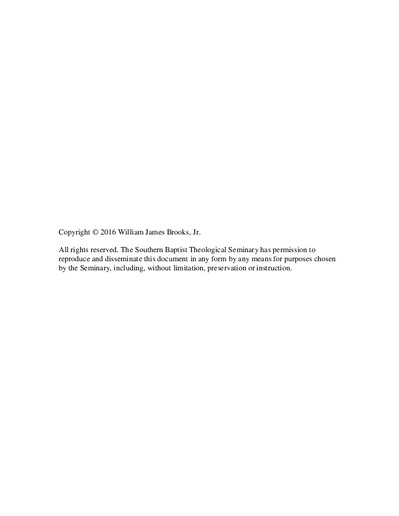The divine design of Christian suffering: mortification, maturation, and glorification
Abstract
Chapter 1 introduces the dissertation’s thesis and highlights its methodology. This dissertation argues that the divine design for suffering in Christ-followers is to decrease self-rule through mortification, increase God’s rule through engendering spiritual maturity, with both of these functions serving the ultimate purpose of God glorifying himself in the individual lives of his covenant people. This chapter also sets the argument within the contemporary context of biblical counseling.
Chapter 2 explores the first major element of the thesis, that God designs suffering to decrease self-rule in his covenant people through mortification. This theme is traced through the lamenting psalmists, the Suffering King’s attack on self-rule via the cross, and Jesus’ imperative to self-denial.
Chapter 3 argues the second major element of the thesis, that God designs suffering to increase his rule in his covenant people by engendering the blessings consistent with spiritual maturity. This thought is developed by examining the spiritual maturity suffering produced in the lamenting psalmists and Jesus. Six New Testament passages are examined which indicate suffering is instrumental in engendering spiritual maturity in the Christ-follower.
Chapter 4 demonstrates the third major thesis element that suffering that the ultimate purpose of suffering in Christ-followers is to glorify God. This conclusion is reached by examining the lamenting psalmists glorification of God, Jesus glorifying the Father in his sufferings, Christ-followers’ glorification of Christ through suffering, and how God glorifies himself when suffering ceases.
Chapter 5 defends the dissertation thesis against the challenges forwarded by open theism. The main arguments focus on open theism’s contention that no divine design for suffering exists and suffering is purposeless. The last section critiques the implications open theistic beliefs has on trusting God, Christ and the gospel, prayer, and eternal hope.
Chapter 6 proposes that the cognitions, affections, and volitions of the heart are each mortified of their unchristlikenesses, conformed to Christlikeness, both for the glory of God through suffering. The last section is directed to biblical counselors to give indicators of self-rule in sufferers and to suggest how they may minister to all the suffering heart’s functions.
Chapter 7 concludes the dissertation by giving a summary of its arguments, suggestions for further research, and some concluding thoughts.

